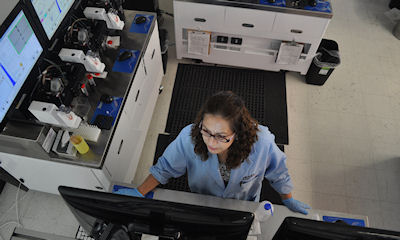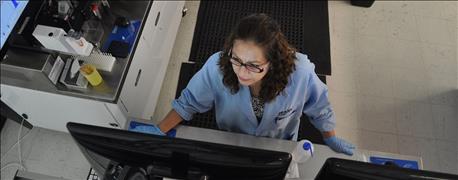July 9, 2015

By Harley Buchholz
"We excel at providing sorted semen," says Roger Breunig, director of livestock for an international company aptly named Sexing Technologies. "That is our business."
In Wisconsin, ST provides semen sorting services to ABS-Global in DeForest and Accelerated Genetics in Westby, where a rotating herd of 300 embryo donor dairy cows is housed. Semen is sorted from ST's own lineup of 300 dairy bulls at TWG-ST, the former Trans World Genetics in Fond du Lac.
Company spokesmen say their sorting produces about 90% gender purity for the desired sex.

HIGH-TECH: Semen sorting is done in state-of-the-art, on-site labs.
Growing business
Texas-based ST has been operating in Wisconsin since 2006, primarily with dairy breeds. Some beef bulls and cows are kept in Wisconsin but most of the beef sorting is done in Texas.
"This is the 10th year of using our technology to sort semen," says Breunig. The process does not involve genetic modification. Company officials point out that while the technology to sort semen is available and other AI organizations are working on it, no one else in the U.S. is using it. Sexing Technology does work with other AI organizations, placing some of its own employees at their headquarters.
The bulls kept in Fond du Lac are European Union-certified, Breunig says, "which allows our sales and marketing to be global." China and Brazil, he says, are active markets for the company, which recently acquired TransAmerica Genetics in Canada. The donor cows, he goes on, carry "the elite genetics in the specific breed they're in. Since genomics were discovered, these are the top 10% of the breeds."
Their embryos produce not only succeeding generations of top pedigree females but also the next generations of top bulls in their breeds for ST's own herd and other AI organizations the company works with. ST also ships conventional semen and some of the cows at DeForest are owned in a joint venture with a group from Iowa and Illinois. Semen prices, Breunig says, range from $30 to $125 per straw.
~~~PAGE_BREAK_HERE~~~
"We have a wide portfolio of genetics to assure our customers have a productive herd," says Breunig; "outside genetics continue to be purchased," always with an eye toward improvement. ST offers a general selection of beef bulls and primarily Holstein and Jersey dairy bulls but has other colored breeds as well. "We have not given up on the other colored breeds as some large AI organizations have," Breunig notes.
The company's sire directory for dairy lists black and white and Red Holsteins, Jersey, Brown Swiss, Milking Gyr and dairy crossbreds. The beef directory offers Gray and Red Brahman, Guzerat, Red and Black Angus, Red Brangus, Wagyu, Simmental, Braunvieh, Beefmaster, Hereford and bucking stock.
State-of-the-art labs
Semen sorting is done in state-of-the-art, on-site labs.
Feed for the herd is grown locally on ST's 260-acre farms at both locations; plus, the company works with local farmers to buy additional feed.
ST has close to 200 employees in Wisconsin, most of them at the Fond du Lac location, including those with PhD credentials who work in the Fond du Lac lab.
Juan Moreno, Co-CEO of ST, is quoted in an article that appeared in The Bullvine as pointing out that "ST sexed semen is in everyday use on thousands of farms (both beef and dairy) in 15 countries around the world." (ST also processes sexed semen in deer, elk and horses.)
According to the company's website, soon to be updated at www.SexingTechnologies.com, the breakthrough in semen-sexing technology was made in the 1980s by USDA researchers in Livermore, Calif., and Beltsville, Md. Commercialization of sexed semen in the United States was initiated with a 2003 license granted to ST. By the next year the company was sorting semen in its first lab at ST headquarters in Navasota, Texas. It now has facilities in six states and seven foreign countries.
For the move into dairy, Wisconsin was an obvious choice, says Breunig.
"Wisconsin is ideal for the organization," he says. "The climate supports AI very nicely from a biosecurity standpoint."
Buchholz writes from Fond du Lac.
You May Also Like




